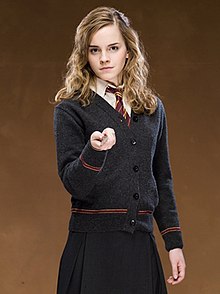To be honest, I found the post fairly self-involved. But then again, when I read things like that (or about girls who are constantly harassed by guys) I always have a knee-jerk reaction of conceited, much? I'll admit, it's knee-jerk as I said, but what bothered me most about the post was that it didn't even correctly describe the stereotype of the MPDG. She also totally missed the mark (In my opinion) when she mentioned characters in both Harry Potter and Doctor Who. I could probably write an entire blog post deconstructing her blog, but instead I thought I'd focus on something much more constructive -- non-stereotypical female characters.
Ladies, we've come a long way. There was a time when it was a man's world out there in the literary genres. I'm not defending it, just stating that's the way it was. Look at Sue Storm (aka the Invisible Woman). Originally, she was just capable of turning invisible. Years passed and people realized that Sue could be more valuable than a damsel in distress or a love interest for Reed (or Namor) and gave her a bit of a boost. In fact, Dr. Doom said that Sue was the most powerful member of the Fantastic Four.
And it's not just the superpowers that got a helping hand. Personalities, motivations and even careers have morphed over the years. Unfortunately, there's still a lot of stereotypes out there. For example, women should look a certain way. If you haven't watched it yet, watch this awesome video of Dustin Hoffman talking about his preparation for the role of Tootsie.
Just like with ogres, women should have layers (and in general, characters of either gender ought to be complicated enough that they have depth, but today we're focusing on the womens). I conducted an informal poll earlier today, asking friends to name their favorite female characters (and why). Not surprisingly, there were several repeat offenders:
Elizabeth Bennet
Jane Eyre
Katniss Everdeen
Hermione Granger
Lisbeth Salander
I love how this list incorporates different women from different genres and styles of literature. I also love that not all of them are the same type of female character. Looking at the list quickly, a couple of things stand out. None of these characters are exceptionally beautiful and several of them are very smart. Elizabeth and Jane are both rather plain. Katniss is not unattractive, but she is not a beauty queen. Hermione is a bit of an ugly duckling at first, though she does blossom, and Lisbeth hardly conforms to modern society's take on beauty norms.
I could probably talk at length about each of them, though I would have to admit that I've only seen movie versions of Lisbeth and not yet read the books. But I think I'd rather focus on one or two, for the sake of time. Elizabeth Bennet is a very good example of a strong female character who - despite the ideals of the time, is not afraid to speak her mind. She is also flawed and not afraid to - when it becomes apparent - admit that she was wrong and make amends.
 | ||
| I love Mr. Darcy |
 |
| Levi OH sa, not LevioSAH |
Rowling herself said that Hermione had "a lot of insecurity and a great fear of failure". But we have the luxury of watching her grow and mature through the course of the books, and we see how her relationships with Ron and Harry help her become a better person, just as she helps them. Just as in real life, our friends affect us.
Whether they're a plot device, a love interest, an antagonist or protagonist, writing a female (or any) character should be as simple as this -- writing a believable person.
People are very complex creatures. The issue with the MPDG isn't that she's eccentric or quirky or bohemian or any other word you choose to describe her. It's that she's little more than a frame around a mirror used for the main character to reflect on. She has no purpose other than to be support for the main character, and that's author driven, which makes a character less believable.
Readers are very smart people. They can usually tell if there's a cardboard character imposing on the story or if there's some spark of life that makes the interaction, dialogue or action make sense. They can also usually tell if there's a giant stereotype hitting them over the head. Girl Next Door. Femme Fatale. Characters become less believable when they are strictly used to meet an author's end. Bad writing happens when authors force characters to do things, simply because they have a vision of a story. For example, Girl A ends up with Boy B despite the obvious chemistry she has with Boy C just because the author wanted to rewrite Romeo & Juliet (including the ending).
In short, characters that remind us of real people aren't necessarily stereotypes, but stereotypes won't necessarily become believable characters. And in closing, this quote from one of my friends: They are strong but not invincible, smart as hell, flawed but working on it, and most of all, they are not men with boobs.
I'm selfish, impatient and a little insecure. I make mistakes, I am out of control and at times hard to handle. But if you can't handle me at my worst, then you sure as hell don't deserve me at my best.
Marilyn Monroe
Wonderful post!! I think you've hit the nail on the head on why we love our favorite females in literature. I especially love the quote, "They are strong but not invincible, smart as hell, flawed but working on it, and most of all, they are not men with boobs."
ReplyDelete